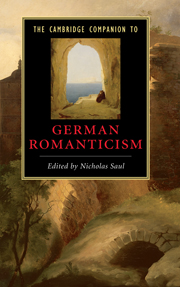Book contents
- Frontmatter
- 1 What is Romanticism, and where did it come from?
- 2 From early to late Romanticism
- 3 Prose fiction of the German Romantics
- 4 The Romantic lyric
- 5 The Romantic drama
- 6 Forms and objectives of Romantic criticism
- 7 Romanticism and Classicism
- 8 Women writers and Romanticism
- 9 The Romantics and other cultures
- 10 Love, death and Liebestod in German Romanticism
- 11 Romantic philosophy and religion
- 12 Romantic politics and society
- 13 Romantic science and psychology
- 14 German Romantic painters
- 15 Romanticism and music
- 16 Transformations of German Romanticism 1830-2000
- Key authors and their works
- Further reading
- Index
3 - Prose fiction of the German Romantics
Published online by Cambridge University Press: 28 September 2010
- Frontmatter
- 1 What is Romanticism, and where did it come from?
- 2 From early to late Romanticism
- 3 Prose fiction of the German Romantics
- 4 The Romantic lyric
- 5 The Romantic drama
- 6 Forms and objectives of Romantic criticism
- 7 Romanticism and Classicism
- 8 Women writers and Romanticism
- 9 The Romantics and other cultures
- 10 Love, death and Liebestod in German Romanticism
- 11 Romantic philosophy and religion
- 12 Romantic politics and society
- 13 Romantic science and psychology
- 14 German Romantic painters
- 15 Romanticism and music
- 16 Transformations of German Romanticism 1830-2000
- Key authors and their works
- Further reading
- Index
Summary
Goethe's novel Wilhelm Meisters Lehrjahre (1795-6, Wilhelm Meister's Apprenticeship) was decisively important for the development of prose fiction among the Romantic authors who (to a greater or lesser degree) admired it. There is more than one reason for its powerful impact on Friedrich Schlegel and Friedrich von Hardenberg (Novalis) and their contemporaries. In the words of Nicholas Saul, 'with his Bildungsroman [Goethe] adapted the market's major genre to the common cause of aesthetic education. It was to establish the epoch's dominant novel-paradigm.' Goethe's hero journeys through various romantic attachments, but also through a practical and aesthetic education in the theatre, towards the recognition of personal responsibility and social integration, not least towards marriage. Among the early Romantic authors Goethe's novel provoked a differentiated reflection on the purposes that the novel as a genre might be supposed to serve. Three authors made decisive contributions: Friedrich Schlegel, Hardenberg-Novalis and Ludwig Tieck. In his 'Brief über den Roman' (1800; 'Letter on the Novel'), Schlegel high-handedly dismisses the kind of popular novel distributed by the circulating libraries when he writes: 'Mit Erstaunen und mit innerm Grimm habe ich oft den Diener die Haufen zu Ihnen hereintragen sehn. Wie mögen Sie nur mit Ihren Händen die schmutzigen Bände berühren?' ('I have often watched your servant carrying the heaps of books in to you, with astonishment and inner fury. How can you even touch the filthy volumes?'). For Schlegel, Goethe's model provides above all a more urgently modern alternative.
- Type
- Chapter
- Information
- The Cambridge Companion to German Romanticism , pp. 41 - 66Publisher: Cambridge University PressPrint publication year: 2009
- 1
- Cited by



